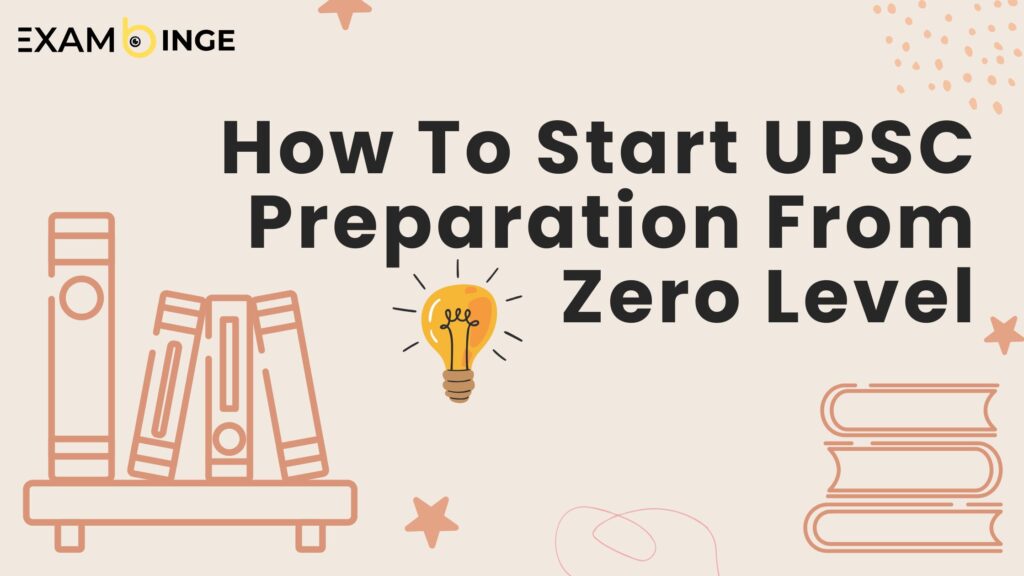Starting your UPSC preparation from scratch can seem overwhelming due to the vast syllabus and the level of competition. However, with the right strategy, a disciplined approach, and persistence, you can achieve success. This guide will provide you with clear and practical steps to begin your preparation effectively.
Understand the UPSC Examination
The Union Public Service Commission (UPSC) Civil Services Examination (CSE) is conducted in three stages:
1. Preliminary Examination (Prelims)
- General Studies Paper I: includes topics such as History, Geography, Polity, Economy, Environment, Science, and Current Affairs.
- General Studies Paper II (CSAT): Tests comprehension, logical reasoning, basic numeracy, and decision-making skills.
2. Main Examination (Mains)
- Includes nine papers: Four General Studies papers, two papers on an optional subject, one essay paper, and two qualifying language papers.
- Emphasizes analytical and descriptive writing.
3. Personality Test (Interview)
- Evaluates your personality, communication skills, and ability to handle real-life situations.
Knowing the exam pattern and syllabus is important for better preparation. Break the syllabus into smaller topics and prioritize them based on your strengths and weaknesses.
Steps to Start UPSC Preparation
1. Set Clear Objectives
- Know why you want to pursue UPSC and set realistic goals.
- Plan your preparation timeline based on your available time and resources.
2. Begin with NCERT Books
- NCERT textbooks provide a strong foundation for subjects like History, Geography, Economics, and Polity.
- Recommended NCERTs:
- History: Class 6 to 12
- Geography: Class 6 to 12
- Polity: Class 9 to 12
- Economics: Class 9 to 12
3. Create a Study Schedule
- Dedicate specific time to each subject, along with current affairs and regular revision.
- Include short breaks and weekly assessments in your plan.
4. Focus on Current Affairs
- Make it a habit to read daily newspapers such as The Hindu or The Indian Express.
- Take notes on key issues, government policies, and international events.
- Use reliable magazines like Yojana and Kurukshetra for detailed analysis.
5. Choose Your Optional Subject Wisely
- Pick a subject you are passionate about and have access to study materials for.
- Popular choices include Sociology, Geography, Public Administration, and History.
Practice Makes Perfect
1. Solve Previous Year Question Papers
- Get acquainted with the exam structure and types of questions asked.
- Regular practice helps you identify gaps in your knowledge.
2. Join Test Series
- Join a test series to practice exam conditions and monitor your progress.
- Analyze your performance to improve weak areas.
3. Develop Answer-Writing Skills
- Practice writing concise and well-structured answers for Mains.
- Focus on presenting clear arguments with supporting facts.
Build Strong Habits
1. Stick to Limited Resources
- Avoid overwhelming yourself with too many books or materials.
- Rely on standard references and trusted online sources.
2. Maintain a Balanced Routine
- Include physical activity, meditation, or hobbies in your schedule to stay refreshed.
- Ensure sufficient sleep and a healthy diet.
3. Stay Updated
- Keep track of any changes in the syllabus or exam format.
- Engage with other aspirants and mentors for insights and motivation.
Sample Study Plan for Beginners
| Time | Activity |
|---|---|
| 6:00 AM – 6:30 AM | Morning exercise or meditation |
| 6:30 AM – 8:00 AM | Newspaper reading and current affairs |
| 8:00 AM – 9:00 AM | Breakfast and personal time |
| 9:00 AM – 12:00 PM | Study session: NCERTs or core subjects |
| 12:00 PM – 1:00 PM | Lunch and relaxation |
| 1:00 PM – 4:00 PM | Study session: Optional subject |
| 4:00 PM – 5:00 PM | Break: Walk, TV, or personal activity |
| 5:00 PM – 7:00 PM | Study session: Revision and practice |
| 7:00 PM – 8:00 PM | Dinner |
| 8:00 PM – 9:30 PM | Mock tests or answer writing practice |
| 9:30 PM – 10:00 PM | Wind down and plan for the next day |
| 10:00 PM | Sleep |
Frequently Asked Questions
1. Can I prepare for UPSC at home?
Yes, with discipline and the right resources, you can effectively prepare for UPSC at home
2. How many hours should I study daily?
Aim for 6-8 focused hours, adjusting based on your capacity and understanding.
3. Is coaching necessary for UPSC preparation?
Coaching is optional. Studying independently with good materials can also lead to success.
4. How much time is needed to prepare for UPSC?
On average, 12-18 months of dedicated preparation is recommended.
5. How do I stay motivated?
Break your journey into small milestones, celebrate achievements, and seek support from peers or mentors.
Starting UPSC preparation from scratch may seem daunting, but with a strategic approach and consistent effort, success is within reach. Stay focused, adapt as needed, and keep pushing towards your goal.Good luck on your journey to becoming a civil servant!
If you enjoyed this blog, don’t miss out on our previous one How to Create Timetable for UPSC Preparation 2025




